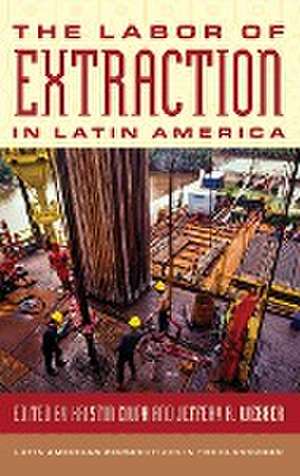Labor of Extraction in Latin America: Latin American Perspectives in the Classroom
en Limba Engleză Hardback – 8 ian 2024
Kristin Ciupa and Jeffrey R. Webber bring together a team of international experts who look at labor in several extractive sectors¿including oil and gas, mining and agriculture, and migrant labor. They present a variety of viewpoints and case studies, exploring themes of the strategic organizing potential of extractive workers, the rise of informal labor and its impact on organizing and worker solidarity, and migrant labor-power as extraction. The book analyzes relationships between workers, extractive companies, states, political parties, national social sectors, and global commodity markets. The Labor of Extraction in Latin America puts the question of labor organizing to the forefront of discussions on Latin Americäs ongoing history of extractive capitalism, its effects on nature, and resistance against it.
Preț: 540.91 lei
Preț vechi: 702.48 lei
-23% Nou
Puncte Express: 811
Preț estimativ în valută:
103.52€ • 109.47$ • 86.35£
103.52€ • 109.47$ • 86.35£
Carte tipărită la comandă
Livrare economică 31 decembrie 24 - 14 ianuarie 25
Preluare comenzi: 021 569.72.76
Specificații
ISBN-13: 9781538187548
ISBN-10: 153818754X
Pagini: 268
Ilustrații: Illustrations, unspecified; Black & White Illustrations
Dimensiuni: 157 x 235 x 20 mm
Greutate: 0.56 kg
Editura: Rowman & Littlefield Publishers, Inc.
Seria Latin American Perspectives in the Classroom
ISBN-10: 153818754X
Pagini: 268
Ilustrații: Illustrations, unspecified; Black & White Illustrations
Dimensiuni: 157 x 235 x 20 mm
Greutate: 0.56 kg
Editura: Rowman & Littlefield Publishers, Inc.
Seria Latin American Perspectives in the Classroom
Cuprins
Table of Contents
PART ONE ¿ THEORETICAL FRAMEWORK
Chapter One ¿ Introduction: The Labor of Extraction in Latin America
Kristin Ciupa and Jeffery R. Webber
PART TWO ¿ REVISITING THE CLASSICAL CASES
Chapter Two ¿ The Political Economy of the Labor Movement in Contemporary Argentina
Ruth Felder and Viviana Patroni
Chapter Three ¿ Oil and the Dualization of Venezueläs Labor Movement
Kristin Ciupa
Chapter Four ¿ A Labor History of Extractivism in Colombia: From Coffee to Coca and Beyond
Phillip A. Hough
Chapter Five ¿ Reading Peru from Chile: Examining Mining Unionism in the Twentieth and Twenty-First Centuries
Omar Manky
Chapter Six ¿ Capital Accumulation and the Forms and Potentialities of the Labor Movement in Latin America: Critical Reflections on Argentina and Chile
Guido Starosta and Fernando Javier Cazón
PART THREE ¿ EXTENDING THE FRAMEWORK
Chapter Seven ¿ Labor/Nature in (Late) Capitalist Mexico
Aleida Hernández Cervantes and Anna Zalik
Chapter Eight ¿ From Sindicalismo to Cooperativismo: The Atomization of the Bolivian Miners¿ Movement
Andrea Marston
Chapter Nine ¿ Migrant Labor as Extraction
Christopher Little
PART FOUR ¿ CONCLUSION
Chapter Ten ¿ Conclusion and New Directions
Jeffery R. Webber
PART ONE ¿ THEORETICAL FRAMEWORK
Chapter One ¿ Introduction: The Labor of Extraction in Latin America
Kristin Ciupa and Jeffery R. Webber
PART TWO ¿ REVISITING THE CLASSICAL CASES
Chapter Two ¿ The Political Economy of the Labor Movement in Contemporary Argentina
Ruth Felder and Viviana Patroni
Chapter Three ¿ Oil and the Dualization of Venezueläs Labor Movement
Kristin Ciupa
Chapter Four ¿ A Labor History of Extractivism in Colombia: From Coffee to Coca and Beyond
Phillip A. Hough
Chapter Five ¿ Reading Peru from Chile: Examining Mining Unionism in the Twentieth and Twenty-First Centuries
Omar Manky
Chapter Six ¿ Capital Accumulation and the Forms and Potentialities of the Labor Movement in Latin America: Critical Reflections on Argentina and Chile
Guido Starosta and Fernando Javier Cazón
PART THREE ¿ EXTENDING THE FRAMEWORK
Chapter Seven ¿ Labor/Nature in (Late) Capitalist Mexico
Aleida Hernández Cervantes and Anna Zalik
Chapter Eight ¿ From Sindicalismo to Cooperativismo: The Atomization of the Bolivian Miners¿ Movement
Andrea Marston
Chapter Nine ¿ Migrant Labor as Extraction
Christopher Little
PART FOUR ¿ CONCLUSION
Chapter Ten ¿ Conclusion and New Directions
Jeffery R. Webber














